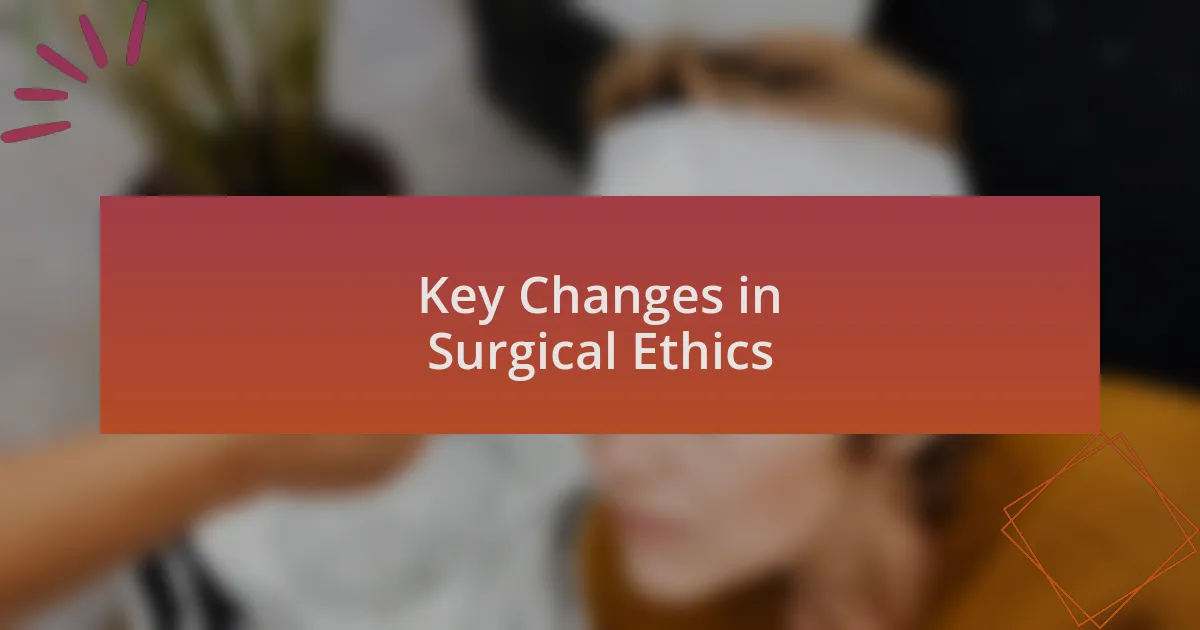Key takeaways:
- Informed consent has evolved to empower patients, ensuring they fully understand risks, benefits, and alternatives to procedures.
- Cultural competence is increasingly recognized as essential in surgical practice, emphasizing the need to consider patients’ backgrounds in care delivery.
- Research has amplified the importance of patient privacy and long-term accountability, stressing that ethical standards must adapt to new findings.
- Collaboration and open dialogue within multidisciplinary teams are vital for navigating complex ethical dilemmas in surgery.

Overview of Surgical Ethics
Surgical ethics embodies the principles that guide surgeons in making decisions that impact the lives of their patients. I remember a time during my training when a mentor emphasized the importance of informed consent. He asked us, “How can we truly be trusted if we don’t ensure our patients fully understand the procedures we perform?” That moment underscored the significant weight that ethical responsibility holds in surgery.
In surgical practice, the balance between beneficence—acting in the best interest of the patient—and non-maleficence—doing no harm—is often delicate. There have been cases where I witnessed surgeons grappling with this balance, especially in high-stakes surgeries. I could feel the tension in the surgical room as one doctor pondered whether the risks of a procedure outweighed the potential benefits, a moment that starkly illustrated the emotional and ethical complexities surgeons face daily.
Additionally, the dynamic nature of surgical ethics means that it is not static; it evolves with societal changes and technological advances. I often find myself reflecting on how innovations, like robotic surgery, push us to reconsider traditional ethical frameworks. How do we ensure that these advancements enhance patient care while staying true to our ethical obligations? It’s a question worth contemplating as we navigate this ever-changing landscape together.

Importance of Ethical Standards
Ethical standards in surgery are not just guidelines; they are the foundation of trust between surgeons and patients. I recall an incident early in my career when a patient refused a vital procedure. At that moment, I realized how crucial it is for patients to feel they are heard and respected. When surgeons uphold ethical standards, they foster open communication, allowing patients to make informed choices about their own health.
The implications of ethical standards extend beyond individual cases; they shape the culture of the surgical community. I remember discussing with colleagues how unethical practices can lead to a cascade of mistrust, impacting not just the doctor-patient relationship but also the entire healthcare system. If we compromise our ethics for convenience, what message does that send to future generations of surgeons? These are the conversations that keep me motivated to advocate for high ethical standards in our profession.
Moreover, adhering to ethical standards enhances the overall quality of care. I’ve seen firsthand how hospitals that prioritize ethics have better patient outcomes and satisfaction rates. It’s fascinating to think that when we prioritize patient well-being over procedural efficiencies, we don’t just improve individual lives; we potentially transform healthcare as a whole. Isn’t it time we fully embraced this responsibility as a guiding principle in our practice?

Key Changes in Surgical Ethics
The evolution of informed consent is one of the most significant changes I’ve observed in surgical ethics. In the past, I often participated in discussions where patients were given limited information about their procedures. Nowadays, the emphasis is on ensuring patients fully understand the risks and benefits, as well as alternative options. Reflecting on these moments, I realize how empowering this shift is for patients; it not only fosters autonomy but also builds trust between the surgeon and the patient. Don’t you think every patient deserves to feel like an active participant in their healthcare journey?
Another key change is the growing recognition of cultural competence in surgical practice. I recall working with a diverse group of patients and facing challenges when cultural beliefs influenced treatment decisions. Now, I see that training in cultural sensitivity is becoming integral in surgical education. This shift recognizes that understanding a patient’s background can greatly enhance the ethical delivery of care. How can we ensure surgery is truly patient-centered if we don’t account for the unique contexts of each individual?
The role of ethics committees has also transformed, evolving from a relatively passive advisory body to an active participant in clinical decision-making. In my experience, I’ve seen these committees tackle difficult cases that raised complex ethical dilemmas. They now often include multidisciplinary teams, ensuring a broader perspective when ethical issues arise. This collaborative approach not only enriches discussions but also supports surgeons in making well-rounded decisions that respect both professional guidelines and the best interests of patients. Isn’t it reassuring to know that we have a network of support when navigating these tough ethical waters?

Impact of Research on Ethics
Research has profoundly influenced surgical ethics, particularly regarding the handling of patient privacy and data security. I remember a case where we had to navigate sensitive patient data that was critical for a study. It became clear to me that maintaining confidentiality goes beyond just a requirement; it’s a fundamental part of respecting a patient’s dignity. How can we genuinely serve our patients if we don’t prioritize their privacy in every aspect of our work?
Another significant impact of research is the evolving idea of accountability within surgical practice. I was part of a groundbreaking study where outcomes were meticulously tracked to assess long-term patient wellbeing. Witnessing the outcomes in real time shifted my perspective on responsibility—it’s not just about performing a procedure, but also about being answerable for the long-term results. Isn’t it empowering to realize that research can help us become more accountable and, ultimately, better surgeons?
The integration of evidence-based practices into surgical ethics is also striking. I recall a moment during a conference when a speaker emphasized the importance of updating ethical standards in light of new findings. It struck a chord with me, highlighting that ethics must be dynamic and responsive to research advancements. How can we remain relevant in our ethical considerations if we don’t consistently evaluate them through the lens of new knowledge?

Personal Experiences in Surgical Practice
I’ve had my share of poignant moments in the operating room that profoundly shaped my approach to surgical ethics. There was one particularly challenging case where I had to decide whether to inform a patient about a potential complication that was unearthed during the procedure. I felt the weight of that decision; honesty and transparency had to guide me, but I was also aware of the emotional burden it might place on the patient. This situation drove home the point that ethical considerations are not always black and white—they often dwell in a gray area that requires deep reflection.
One memorable experience involved a multidisciplinary team discussion about an innovative surgical technique that promised to improve patient outcomes. It was during this collaboration that I realized the essence of ethical practice lies in shared decision-making. I vividly recall voicing my concerns about how different patients could perceive risk and benefit in unique ways. Engaging with colleagues opened my eyes to the complexity of informed consent and its significance in upholding patient autonomy. When did we start viewing surgical practice as a partnership rather than a hierarchical structure?
Throughout my years in surgery, I’ve witnessed how ethical dilemmas often arise from a gap in communication. There was an instance where a miscommunication led to a patient being unprepared for the post-operative care they would require. I remember the feelings of frustration and concern as I engaged with the patient and their family to clarify the situation. It was a powerful reminder that ethical surgical practice involves not just technical skill, but also an unwavering commitment to clear and compassionate communication. How can we claim to uphold ethical standards if we overlook the fundamental human connection in our interactions?

Lessons Learned from Ethical Dilemmas
One significant lesson I learned from an ethical dilemma involved the delicate balance between patient safety and innovation. During a clinical trial for a cutting-edge surgical device, I faced the choice of enrolling patients who may not fully grasp the experimental nature of the procedure. I remember how I struggled with the ethical implications of possibly exposing my patients to unproven risks. This experience taught me that each patient’s understanding and comfort level with innovation must be prioritized to truly honor their autonomy.
In another instance, I found myself confronted with a situation where the surgical team had to decide between aggressive treatment options versus palliative care for a terminal patient. Witnessing the extensive discussions and differing opinions among team members brought home the importance of collaborative ethics. I felt a sense of respect for each perspective, and it highlighted that ethical dilemmas are often diffused through open dialogue. How can we fully grasp the moral dimensions of our choices if we limit the conversation to just our own viewpoints?
Reflecting on the ethical dimensions of informed consent, I once had a patient who, despite his clear and articulate questions, still left our initial meeting feeling uncertain. I felt a pang of responsibility, thinking about how critical it is to ensure that patients not only receive the information but also fully understand it. This experience reinforced my belief that ethical practice requires patience and a commitment to education, prompting me to ask myself: Are we truly equipping our patients to make informed decisions about their own care?